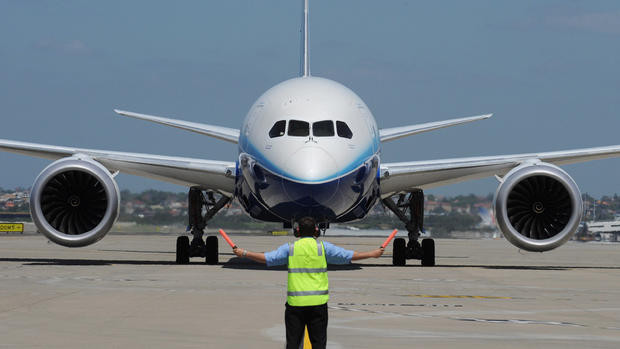FAA orders review of Boeing's new Dreamliner
Last Updated 10:12 a.m. ET
WASHINGTON U.S. federal regulators are ordering a comprehensive review of the critical systems of Boeing's 787s, the aircraft maker's newest and most technologically-advanced plane, after a fire and a fuel leak earlier this week.
Transportation Secretary Ray LaHood announced Friday that the FAA and Boeing are conducting the review. "This review will cover the critical systems of the aircraft, including design, manufacturing and assembly," LaHood said at a press briefing.
"Through it we will look for the root causes of recent events and do everything we can to make sure these do not happen again."
The 787, which Boeing calls the "Dreamliner," relies more than any other modern airliner on electrical signals rather than hydraulics to help power nearly everything the plane does. It's also the first Boeing plane to use rechargeable lithium ion batteries, which charge faster and can be molded to space-saving shapes compared to other airplane batteries. The plane is made with lightweight composite materials instead of aluminum.
A fire ignited Monday in the battery pack of an auxiliary power unit of a Japan Airlines 787 empty of passengers.
National Transportation Safety Board investigators traced the fire to a battery in the plane's auxiliary power unit, typically used to provide heating and cooling when the airplane is on the ground.
In a statement, Boeing said, "Nothing that we've seen in this case indicates a relationship to any previous 787 power system events."
Last month, a United Airlines 787 flight made an emergency landing in New Orleans after false warnings from an electrical panel.
At Friday's briefing, FAA Administrator Michael Huerta said the Dreamliner's electrical system will be the highest level of priority. "We are confident about the safety of this aircraft, but we are concerned about these incidents," he said.
Stating that there is nothing in the data to suggest the plane is not safe, Huerta said that the review would be to verify work done during the plane's certification process.
An FAA statement gave no indication that the agency intends to limit or prohibit the 787 from flying during the review.
"These planes are safe," added La Hood. "I would have no hesitation boarding a flight."
Boeing was cooperating with the review.
Ray Conner, the president and CEO of Boeing, said Friday, "In short, we have complete confidence in the 787, and so do our customers."
Conner said the redundancies that have been built into the Dreamliner "are absolutely phenomenal," and have performed to a high degree. He also discounted a question relating to the outsourcing of labor as Boeing has worked to fulfill orders. "We have complete confidence in our production system and design," he said.
On Friday Japan's All Nippon Airways reported two new cases of problems with the aircraft. ANA spokeswoman Ayumi Kunimatsu said a very small amount of oil was discovered leaking from the left engine of a 787 flight from southern Japan's Miyazaki airport to Tokyo.
The jet returned to Miyazaki, but after checks found no safety risk it flew to Tokyo. ANA said on another flight, to Matsuyama on the island of Shikoku, glass in a cockpit window cracked and the aircraft was grounded for repairs.
- Boeing 787: New Dreamliner has growing pains
- Boeing Dreamliner makes emergency landing as inspections ordered
- Boeing 787 Dreamliner mishap brings safety concerns back front and center
- First "Dreamliner" flight "spectacular"
"Every new airplane has growing pains," said Captain Chesley "Sully" Sullenberger, a CBS News aviation and safety expert. "Especially those that push the edge of the envelope in technology."
He told "CBS This Morning" that these kinds of problems are normal for new aircraft.
"If you look at the history of aviation, decades ago, new airplanes had many more issues and they often led to fatal results," he said. "Now we catch these problems much earlier."
Boeing has insisted that the 787's problems are no worse than what it experienced when its 777 was new in the mid-1990s. That plane is now one of its top sellers and is well liked by airlines.
Boeing has delivered 50 of the 787s, starting in late 2011, and has orders for nearly 800 more. To get through the backlog, Boeing is increasing production to build 10 of the planes per month in Washington state and South Carolina by the end of the year.
By comparison, it builds more than one 737, Boeing's best seller, every day.
The company said in November that it had begun making five 787s per month. But if any major manufacturing changes are needed to fix the problems, it could fall further behind in deliveries.
